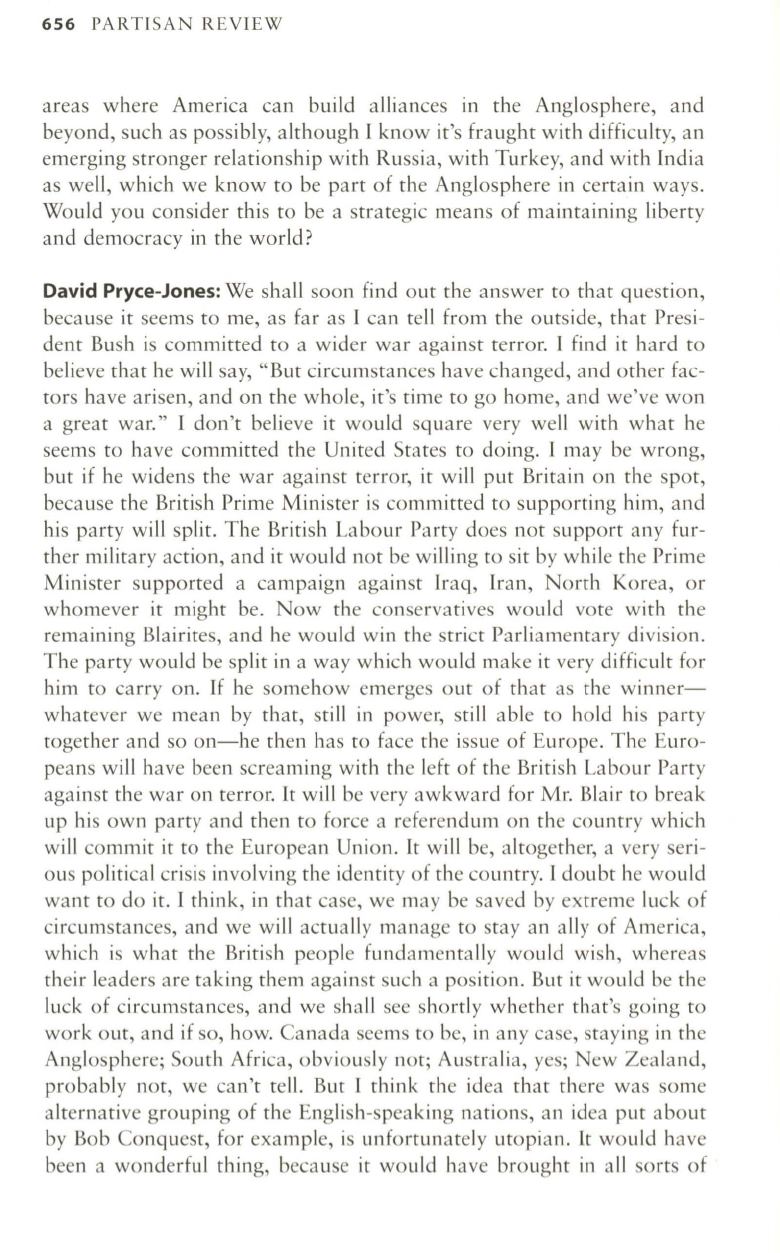
656
PARTISAN REVIEW
areas where America can build alliances in the Anglosphere, and
beyond, such as possibly, although I know it's fraught with difficulty, an
emerging stronger relationship with Russia, with Turkey, and with India
as well, which we know to be part of the Anglosphere in certain ways.
Would you consider this to be a strategic means of maintaining liberty
and democracy in the world?
David Pryce-Jones:
We shall soon find out the answer to that question,
because it seems to me, as far as I can tell ftom the outside, that Presi–
dent Bush is committed to a wider war against terror. I find it hard to
believe that he will say, "But circumstances have changed, and other fac–
tors have arisen, and on the whole, it's time to go home, and we've won
a great war." I don't believe it would square very well with what he
seems to have committed the United States to doing. I may be wrong,
but if he widens the war against terror, it will put Britain on the spot,
because the British Prime Minister is committed to supporting him, and
his party will sp lit. The British Labour Party does not support any fur–
ther military action, and it would not be willing to sit by while the Prime
Minister supported a campaign against Iraq, Iran, North Korea, or
whomever it might be. Now the conservatives would vote with the
remaining Blairites, and he would win the strict Parliamentary division.
The party would be split in a way which would make it very difficult for
him to carryon.
If
he somehow emerges out of that as the winner–
whatever we mean by that, still in power, still able to hold his party
together and so on-he then has to face the issue of Europe. The Euro–
peans will have been screaming with the left of the British Labour Party
against the war on terror.
It
will be very awkward for Mr. Blair to break
up his own party and then to force a referendum on the country which
will commit it to the European Union.
It
will be, altogether, a very seri–
ous political crisis involving the identity of the country. I doubt he would
want to do it. I think, in that case, we may be saved by extreme luck of
circumstances, and we will actually manage to stay an ally of America,
which is what the British people fundamentally would wish, whereas
their leaders are taking them against such a position. But it would be the
luck of circumstances, and we shall see shortly whether that's going to
work out, and if so, how. Canada seems to be, in any case, staying in the
Anglosphere; South Africa, obviously not; Australia, yes; New Zealand,
probably not, we can't tell. But I th ink the idea that there was some
alternative grouping of the English-speaking nations, an idea put about
by Bob Conquest, for example, is unfortunately utopian. It would have
been a wonderful thing, because it would have brought in all sorts of


